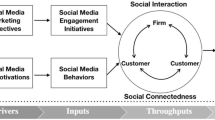Abstract
According to theory, the success of Machiavellians rests, in part, on the situational factor “latitude for improvisation”—the freedom to improvise in order to successfully manipulate others. In their study of Machiavellianism and marketing, Hunt and Chonko concluded that Machiavellianism is unrelated to success; however, the analysis did not include latitude for improvisation as a moderating variable. The data are reanalyzed with a measure of latitude for improvisation included. Theory predicts that Machiavellianism is positively related to success when latitude for improvisation is high. The results of this analysis suggest that Machiavellianism is unrelated to personal success in marketing when latitude for improvisation is high but is negatively related to success when latitude for improvisation is low.
Similar content being viewed by others
References
Calhoon, Richard P. 1969. “Niccolo Machiavelli and the Twentieth Century Administrator.”Academy of Management Journal 12 (June): 205–212.
Chonko, Lawrence B. 1983. “Job Involvement as Obsession-Compulsion: Some Preliminary Empirical Findings.”Psychological Reports 53 (December): 1191–1197.
Christie, Richard and Florence L. Geis. 1970.Studies in Machiavellianism. New York: Academic Press.
Comer, James M. 1985. “Machiavellianism and Inner vs. Outer Directedness: A Study of Sales Managers.”Psychological Reports 56 (February): 81–82.
Corzine, Janice B., Gabriel Buntzman, and Edgar T. Busch. 1988. “Machiavellianism and Careers at Plateau.”Psychological Reports 63 (August): 243–246.
Fornell, Claus and Fred L. Bookstein. 1982. “Two Structural Equation Models: LISREL and PLS Applied to Consumer Exit Voice Theory.”Journal of Marketing Research 29 (November): 440–452.
Fried, Yitzhak. 1991. “Meta-Analytic Comparison of the Job Diagnostic Survey and the Job Characteristics Inventory as Correlates of Work Satisfaction and Performance.”Journal of Applied Psychology 76 (October): 690–697.
Gable, Myron, Charles Hollon, and Frank Dangello. 1990. “Relating Locus of Control to Machiavellianism and Managerial Achievement.”Psychological Reports 67 (May): 339–343.
Gable, Myron, Charles Hollon, and Frank Dangello. 1992. “Managerial Structuring of Work as a Moderator of the Machiavellianism and Job Performance Relationship.”Journal of Psychology 126(3): 317–325.
Gable, Myron and Martin T. Topol. 1988. “Machiavellianism and the Department Store Executive.”Journal of Retailing 64 (Spring): 68–84.
Gable, Myron and Martin T. Topol. 1989. “Machiavellianism and Job Satisfaction of Retailing Executives in a Specialty Store Chain.”Psychological Reports 64 (February): 107–112.
Galbraith, John Kenneth. 1967.The New Industrial State. Boston: Houghton Mifflin.
Guterman, Stanley S. 1970.The Machiavellians. Lincoln: University of Nebraska Press.
Hackman, J. Richard and Greg R. Oldham. 1975. “Development of the Job Diagnostic Survey.”Journal of Applied Psychology 60 (March): 159–170.
Hollon, Charles J. 1983. “Machiavellianism and Managerial Work Attitudes and Perceptions.”Psychological Reports 52 (April): 432–434.
Howell, Roy D. 1987. “Covariance Structure Modeling and Measurement Issues: A Note on ‘Interrelations among a Channel Entity’s Power Sources.””Journal of Marketing Research 24 (February): 119–126.
Hunt, Shelby D. and Lawrence B. Chonko. 1984. “Marketing and Machiavellianism.”Journal of Marketing 48 (Summer): 30–42.
Murray, L. William and Marvin M. Okanes. 1980. “On Age and Machiavellianism.”Psychological Reports 46 (June): 1006.
Pollay, Richard W. 1986. “The Distorted Mirror: Reflections on the Unintended Consequences of Advertising.”Journal of Marketing 50 (April): 18–36.
Schultz, Clifford J. II. 1993. “Situational and Dispositional Predictors of Performance: A Test of the Hypothesized Machiavellianism × Structure Interaction among Sales Persons.”Journal of Applied Social Psychology 23 (June): 478–498.
Sims, Henry P., Jr., Andrew D. Szilagyi, and Robert T. Keller. 1979. “The Measurement of Job Characteristics.”Academy of Management Journal 19 (June): 195–212.
Singhapakdi, Anusorn. 1993. “Ethical Perceptions of Marketers: The Interaction Effects of Machiavellianism and Organizational Ethical Culture.”Journal of Business Ethics 12 (May): 407–418.
Singhapakdi, Anusorn and Scott J. Vitell, Jr. 1991. “Selected Factors Influencing Marketers’ Deontological Norms.”Journal of the Academy of Marketing Science 19 (Winter): 37–42.
Touhey, John C. 1973. “Intelligence, Machiavellianism, and Social Mobility.”British Journal of Social and Clinical Psychology 12 (February): 34–37.
Turnbull, Allen A. 1976. “Selling and the Salesman: Prediction of Success and Personality Change.”Psychological Reports 38 (June): 1175–1180.
Turner, Charles F. and Daniel C. Martinez. 1977. “Socioeconomic Achievement and the Machiavellian Personality.”Sociometry 40(4): 325–336.
Vleeming, R. G. 1979. “Machiavellianism: A Preliminary View.”Psychological Reports 44 (February): 295–310.
Author information
Authors and Affiliations
Additional information
His research interests include marketing ethics, advertising, and marketing communication.
Rights and permissions
About this article
Cite this article
Sparks, J.R. Machiavellianism and personal success in marketing: The moderating role of latitude for improvisation. JAMS 22, 393–400 (1994). https://doi.org/10.1177/0092070394224008
Issue Date:
DOI: https://doi.org/10.1177/0092070394224008




